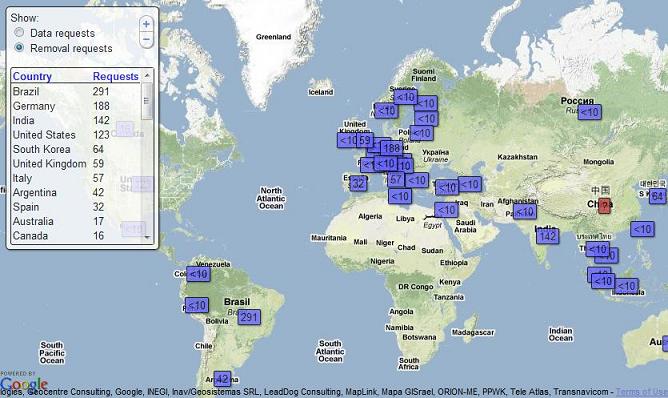Google has just announced the launched the Government Request tool. This tools offers people “information about the requests for user data or content removal [Google] receive from government agencies around the world.”
I sense the launch of this tool might be Google response to the criticism they received while negotiating whether they were going to comply with the Chinese government’s request to censor web services in China. In any case, Google’s announcement invokes Article 19 of the Universal Declaration on Human Rights which states that
“everyone has the right to freedom of opinion and expression; this right includes freedom to hold opinions without interference and to seek, receive and impart information and ideas through any media and regardless of frontiers.” Written in 1948, the principle applies aptly to today’s Internet — one of the most important means of free expression in the world. Yet government censorship of the web is growing rapidly: from the outright blocking and filtering of sites, to court orders limiting access to information and legislation forcing companies to self-censor content.”
All this preamble is to make the point that while Google may take its time negotiating whether to censor information or not, plenty of governments are asking them to remove or hand over information gathered through their services.
The Government Request tool is a map that gathers information from many governments around the world that have asked Google to hand over information, or have it removed from local searches. (04/21/10 – The information is also available as a spreadsheet.) The list of countries here is very varied. The one mayor absence is China, and this absence is explained by the Guardian as follows;
Wired explained the numbers for the U.S.A.;
I’d just like to note that there were less than 10 request for information removals from the Colombian government, and apparently no data requests in the last six months.
Very telling about what governments are up to around the globe. Maybe this initiative will help cool down the prodding into our private lives, but somehow I doubt it…
Google acaba de anunciar el lanzamiento de Gobierno Requests tool (Herramienta de Peticiones Gubernamentales). Esta herramienta nos ofrece “información sobre las solicitudes de datos del usuario o la eliminación de contenido que [Google] ha recibido de agencias gubernamentales de todo el mundo.”
Me da la impresión que el lanzamiento de esta herramienta podría ser la respuesta de Google a las críticas que recibió durante las negociaciones con el gobierno Chino mientras decidía si iban a cumplir con la petición para censurar los servicios web en China. En cualquier caso, el anuncio de Google invoca el artículo 19 de la Declaración Universal de Derechos Humanos que establece que
“Todo individuo tiene derecho a la libertad de opinión y de expresión; este derecho incluye el de no ser molestado a causa de sus opiniones, el de investigar y recibir informaciones y opiniones, y el de difundirlas, sin limitación de fronteras, por cualquier medio de expresión”. Escrito en 1948, el principio se aplica con acierto a la Internet de hoy – uno de los medios más importantes de la libre expresión en el mundo. Sin embargo, la censura del gobierno de la web está creciendo rápidamente: desde el bloqueo total y el filtrado de los sitios, a órdenes judiciales que limitan el acceso a la información y la legislación obliga a las empresas a la libre censurar el contenido. ”
Todo este preámbulo es para hacer el punto de que si bien Google puede tomarse su tiempo mientras negocia la posibilidad de censurar información o no, muchos gobiernos del mundo le están pidiendo que controlen o entreguen información obtenida a través de sus servicios.
La herramienta de Government Request es un mapa que recoge información de muchos de los gobiernos que le han pedido a Google que entregue información, o que censuren cierta información de las búsquedas locales. (04/21/10 – La información también está disponible en una hoja spreadsheet.) La lista de países incluidos aquí es muy variada. La gran ausente es la China, y esta ausencia se explica en The Guardian de la siguiente manera;
Wired explica los números para los U.S.A.;
Me gustaría señalar que hay menos de 10 solicitudes decensura de información del gobierno colombiano, y al parecer no las solicitudes por información en los últimos seis meses.
Muy elocuentes los que nos dice esta herramienta sobre el comportamiento de muchos gobiernos alrededor del mundo. Tal vez esta iniciativa ayudará a enfriar las introspecciones en nuestras vidas privadas, pero de alguna manera lo dudo…
